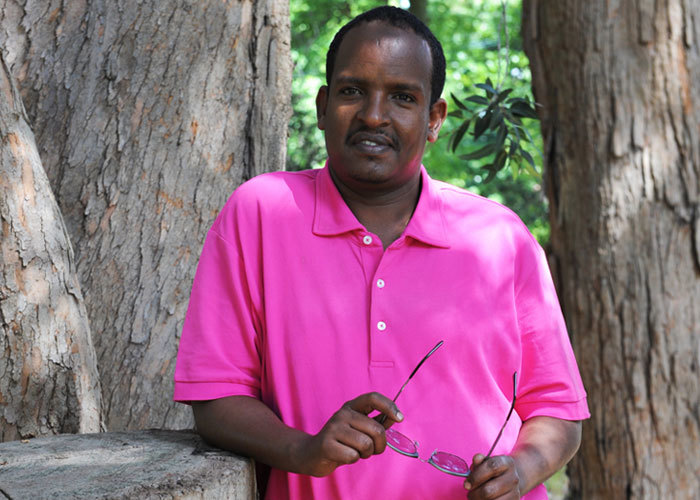From Somaliland to UCT: journey of a scholar at risk
12 December 2014 | Story by Newsroom
Mohamoud Farah is about to embark on a long journey home on a foreign passport. From the continent's deep south, he will travel for two days, via Johannesburg to Ethiopia, and then across the border to Somaliland where he is a professor of law at the University of Hargeisa.
Nuzzled between Ethiopia, Djibouti, and Somalia on the Horn of Africa, the former British Somaliland protectorate won a negotiated independence from Britain in 1960.
At about the same time, Somalia became independent from Italy and the two Somali states were united in 1960, a disastrous relationship characterised by prolonged civil war in the 1980s, oppression and genocide. As a result, swathes of Somalilanders became displaced or refugees.
In 1991, Somaliland claimed back its independence from Somalia, set up a multi-party democracy and a free market economy. But international recognition has been too slow for the massive rebuild required.
Factors like these leave many of Africa's scholars isolated and, in Farah's case, in political limbo. Scholarship in an information age hinges on collaboration and research networks, travel, a sound academic infrastructure and online connectivity.
Dean of Hargeisa's College of Law, deputy chair of the Somaliland Law Reform Commission and an attorney at the Somaliland Bar, Farah flew to Ethiopia twice to present his documents at the South African Embassy in Addis Ababa (there is no SA diplomatic mission in Somaliland).
His Somaliland passport was refused the first time, even though he had used it several times to travel to South Africa. Eventually, Farah was granted a passport from Djibouti, but Ramadan required that he wait before submitting visa applications. Each visa application meant a trip back to Ethiopia.
Farah's sojourn at UCT, meant to start in July, began only in September.
Hosted by the Faculty of Law's Centre for Comparative Law in Africa (CCLA) under the scholars-at-risk programme, Farah is working on a project to map Somaliland customary law.
The project is underpinned by the CCLA, with funding from the National Research Foundation and the University of Hargeisa, a young institution established in 2000. With 4 600 students, the institution has nine faculties and ten colleges. In 2002 a legal clinic was established at Hargeisa's law faculty, in collaboration with the United Nations Development Programme.
Somaliland's legal system is a mirror of its history; a mixed bag of customary law, Islamic law, and European statutory law, each holding sway at different stages of the country's past, writes lawyer and editor of Somalilandlaw.com Ibrahim Hashi Jama in his Introduction to Somaliland Law.
Islamic and customary law governed family life and much of the life of nomadic communities, while European statutory law was observed during the protectorate years when British ordinances based on common law governed formal and state-related aspects of life.
The Somaliland customary law project is a good fit with the CCLA's raison d'être: to build more comprehensive legal systems in Africa and facilitate regional integration so important in areas such as economics.
Somaliland itself reflects the broader picture in Africa; the British, French, Portuguese, German and Italian colonial histories of many African countries have created a mélange of inherited, pluralistic legal frameworks that govern life on the continent.
Chair of the CCLA, the polyglot Professor Salvatore Mancuso provides some examples. Botswana belongs to pure common law tradition; Francophone and Lusophone countries to civil law tradition. Mauritius' legal system has a French-speaking heritage.
"The only way to create a viable legal framework for all countries would be to create a comparative analysis that identifies commonalities," he said in an interview in UCT Alumni News 2013. "If you impose a predominant or hegemonic system, you run the risk of rejection."
Hargeisa's law students are now being trained to conduct field trips into rural areas to gather data on customary laws in use there. Using tablets, the information is uploaded directly onto a web platform.
Working with Farah, Mancuso has already made a trip to Somaliland to develop the research strategy and help set up the research team. Another trip is planned for 2015.
Farah's trip to UCT cemented much of the planning and gave the scholar an opportunity to extend his own research. He particularly enjoyed the well-resourced libraries. In Somaliland, books are scarce, he says.
But things are changing there, albeit slowly, he adds. Campaigns such as the World Bank's Doing Business in Somaliland project are gaining momentum. But help is needed to develop the country's resources.
The deep-water port of Berbera is a hub; a gateway for landlocked Ethiopia. With the right technology, there's oil and gas to be tapped and the world's largest gypsum deposits to be mined. The livestock trade with Yemen and Saudi Arabia is thriving but dependent on proper disease control.
Collaborating with African universities like UCT is one way of building the academic infrastructure and intellectual capital.
On the eve of his departure back to Somaliland, Farah summed up his own scholastic 'beneficiation' at the CCLA: "I will carry this knowledge back to my country."
The UCT scholars-at-risk programme is funded by the Sigrid Rausing Trust and convened by UCT's International Academic Programmes Office under the umbrella of the Eric Abraham Academic Visitorships Programme.
Story by Helen Swingler. Image by Michael Hammond.
 This work is licensed under a Creative Commons Attribution-NoDerivatives 4.0 International License.
This work is licensed under a Creative Commons Attribution-NoDerivatives 4.0 International License.
Please view the republishing articles page for more information.










